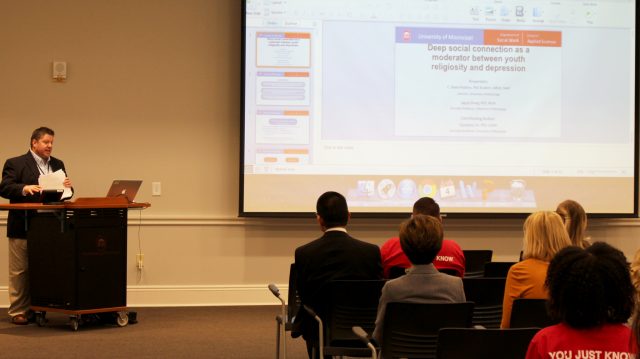
Shane Robbins, UM social work lecturer, presents research on youth religiosity and depression at the Alabama-Mississippi Social Work Education Conference. Photo by Jessica Shipp
OXFORD, Miss. – Celebrating 50 years of educating future social workers, the Department of Social Work at the University of Mississippi recently welcomed more than 250 social work faculty and students from universities across both states to the 48th Annual Alabama-Mississippi Social Work Education Conference.
This year’s conference had a full slate of presentations tied to the conference theme, “Building Bridges in a Polarized World.” Ole Miss faculty and students played a major role in presenting relevant social work research and topics pertinent to the profession to representatives from 20 different colleges and universities.
“For 48 years, this conference has represented the collaborative space between schools of social work across our two states,” said Drew Lefmann, UM coordinator of advising, recruitment and retention and adjunct faculty in social work.
“We recognize that Alabama and Mississippi share a lot of cultural history and face today’s social problems with a shared lens as a united front. Our schools of social work prepare future social work practitioners and educators to make a significant impact in this region. We believe it’s important to come together each year to sharpen ourselves while fulfilling the vision that was cast a half-century ago.”
Nathaniel Bain, a senior social work major from Rienzi who attends the UM regional campus in Tupelo, co-presented “Engaging Students and the Community Through a Student Social Work Organization” with Shane Robbins, social work lecturer, and fellow senior social work major Brittany Murphy, of Tupelo.
“My favorite part of the conference was getting to meet professionals in my field from all over the South,” Bain said. “The most valuable piece of information I (learned) was that social work can be anything, from helping motivate others to get politically active to helping clients grieve after a loss.
“This field has so many opportunities to help improve your community.”
The conference offered students opportunities to network with local employers and provided information about graduate school opportunities, Bain said.
Murphy appreciated the opportunity to present at a professional conference and learn about a wide breadth of issues social workers face every day in the field.
“I think that is so important, as future social workers and actual social workers, to hear different voices and opinions and to consider topics that we may not have previously,” Murphy said. “That is how we continue to grow.”
Morgan Blythe, a senior social work major from Booneville, presented an analysis of literature on microaggressions committed against minority university students.
“The purpose of the presentation was to explain and clarify the term as it relates to social work and educate social workers on the importance of microaggressions in regard to clients, as well as society in its entirety,” said Blythe, who also is a member of the Sally McDonnell Barksdale Honors College.
“It was an honor to present at the conference, and I believe it will be incredibly informative in my future as I pursue higher education in social work.”
UM social work faculty members Na Youn Lee, Patricia Digby and Steven Soifer hosted presentations on engaging students in the community through voter empowerment and analysis of social resistance movements, respectively. Saijun Zhang, Younghee Lim and Robbins presented their research exploring correlations between deep social connections, religious service participation, and beliefs and depression among youth.
“The findings suggest that it is likely that religious belief, rather than religious service participation, has a protective effect on youth mental health, and such a protective effect is most likely to be manifested among youth who have deep social connections, namely having someone to talk to about serious problems,” said Zhang, emphasizing the findings’ useful implications for programs aimed at strengthening youth faiths as a protective mechanism for their mental well-being.
Misa Kayama, assistant professor of social work, presented research that explores how gender and socioeconomic status affect how a person in India experiences stigma related to disabilities – an issue that affects social work clients in the U.S. and abroad.
“Research participants with disabilities from low-income families described limited access to medical services, including necessary treatments for their disabilities, primary and secondary education, and higher-paying, stable jobs,” Kayama said. “Female participants also experienced limited access to educational/social activities due to traditional gender role expectations.”
Social work faculty and students from the University of Southern Mississippi, University of Alabama, Auburn University, Troy University, Jackson State University, Jacksonville State University and Ball State University offered research and presentations spanning social isolation in older persons, pet therapy in social work practice, educational attainment of foster youth aging out of care, explaining death and loss to children through books, social workers’ civic engagement, interdisciplinary classroom environments, field education in legal clinics, and racism-based trauma in social work.
The School of Applied Sciences, home to the Department of Social Work, offers professional preparation programs that integrate academic study, clinical training, creative research, service-learning and community outreach, leading to the development of leaders whose professional endeavors will improve health and well-being.